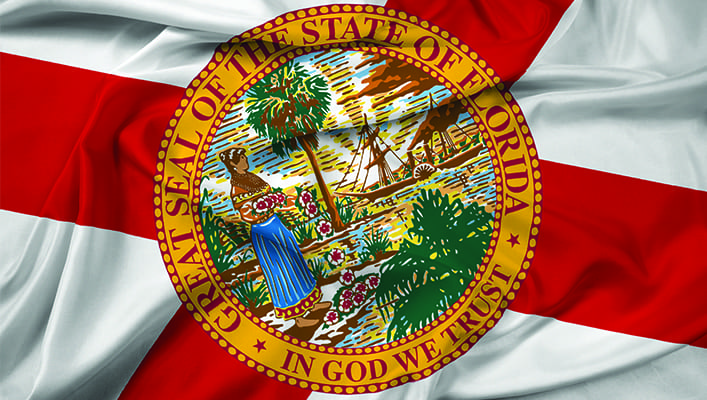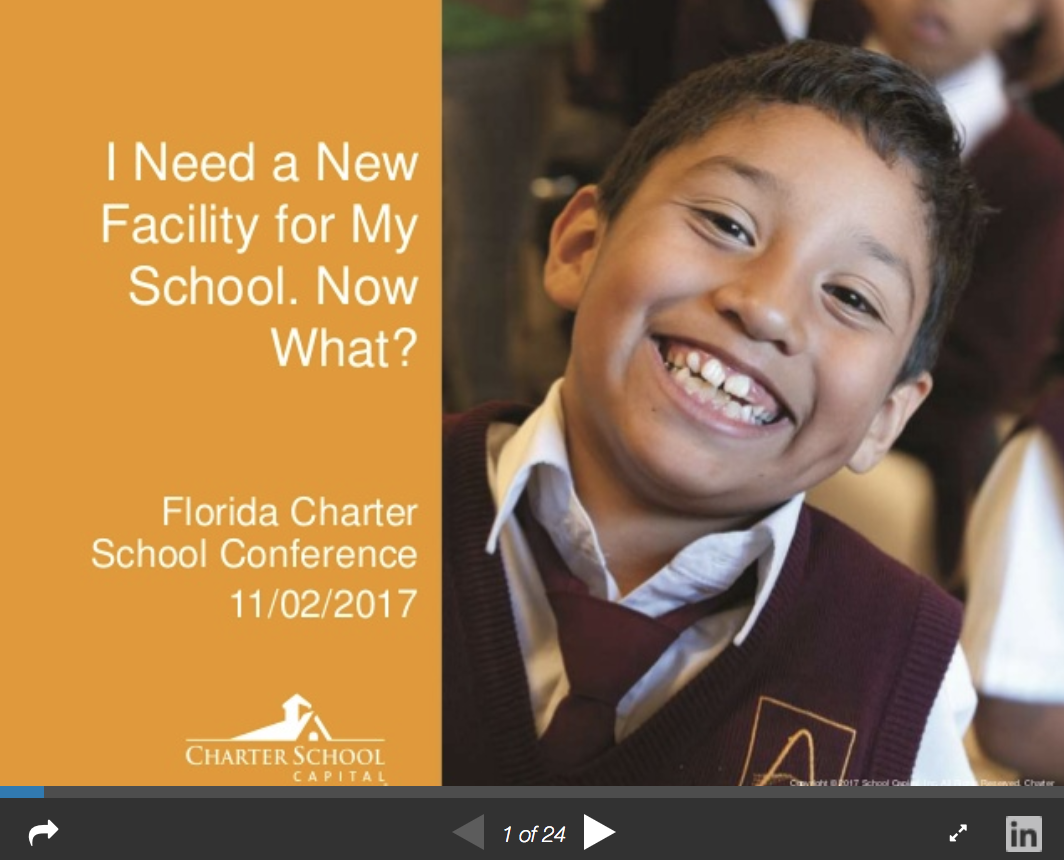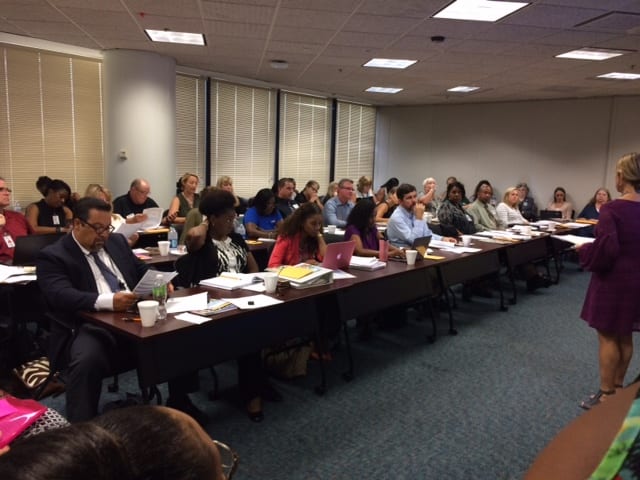
Florida Legislative and Constitutional Revision Commission Update
This article was co-written by Kevin Burgess, Client Service Representative at Charter School Capital and Larry Williams, DPL, Owner/Managing Partner, Larry Williams Consulting LLC
This year’s legislative session is shaping up to be just as lively as last’s year’s for charter schools in Florida. The Education Committee in the Florida House of Representatives introduced HB 7055 an extensive education bill that deals with many topics including some that should be of interest to charter schools.
The highlights for charter schools of HB 7055 are:
School Leader Preparation Programs:
- The bill allows charter schools and charter management organizations to submit applications to establish Level I and Level II leader preparation programs or program renewals.
Deferral of Opening:
- The bill allows a charter school to defer opening for up to 3 years, rather than two.
Surplus Facilities:
- The bill requires that tangible personal property that has been properly classified as surplus, marked for disposal, or otherwise unused by a district school board must be provided for a charter school’s use on the same basis as it is made available to other public schools in the district. A charter school receiving such property may not sell or dispose of the property without written permission of the school district.
High Performing Charter Schools:
- The bill revises the criteria determining a high-quality charter school by also allowing a school that receives two consecutive grades of “A” to be determined a high-performing charter school. It allows a high-performing charter school to replicate up to two new schools that substantially replicate one of its high-performing schools. For those schools qualifying under the two consecutive grades of “A” provision, the bill revises the financial eligibility requirements to require only 2 years of financial audits that received an unqualified opinion and no state of financial emergency.
- The bill clarifies that the increase in student enrollment may occur as long as it does not exceed the capacity of the facility at the time of enrollment, rather than the original capacity of the facility, allowing a charter school that has expanded its original facility or has access to additional facilities, to increase enrollment without being limited to the original facility capacity.
- The bill also provides that facility capacity for purposes of grade level expansion must include any improvements to an existing facility or any new facility in which a majority of the students of the high performing charter school will enroll.
Charter School Contracts:
- The bill revises the initial term of a charter to 5 years. The bill allows a planning period of 1 year in addition to the 5-year charter.
- The bill specifies that, in the event of a termination or nonrenewal, the sponsor must have clear and convincing evidence that one of the disqualifying factors occurred. The bill also specifies that a violation of law must be material in order to constitute a disqualifying factor.
- The bill revises the hearing procedures once a charter school receives its notice of termination or nonrenewal by removing the option for the school district to conduct a direct hearing. The hearing must be conducted by an administrative law judge within 90 days after receipt of the request for a hearing, and the administrative law judge must issue the final order. The administrative law judge must also award the prevailing party reasonable attorney fees and costs incurred during the administrative proceeding and any appeals.
- The charter school governing board may, within 30 calendar days after receiving the judge’s final order, appeal the decision pursuant to s. 120.68, F.S.
- The bill also revises the ability of charter schools to modify their charter due to consolidation and provides that a charter school with a school grade of “C” or higher that closes as part of a consolidation must be reported by the school district as a consolidation.
- Services provided to a Charter School by a School District: If a dispute regarding a contract to provide goods and services cannot be resolved through mediation, an appeal may be made to an administrative law judge appointed by the Division of Administrative Hearings, rather than the Charter School Appeals Commission. The administrative law judge has final order authority to rule on the dispute and shall award the prevailing party reasonable attorney fees and costs incurred during the mediation process, administrative proceeding, and any appeals, to be paid by the non-prevailing party.
Background Screening:
- If a charter school has their employees undergo background screening through the school district in which the charter school is located, the bill requires the district to provide the background screening results of its governing board members and instructional and non-instructional personnel to the charter school within 14 days after submission of the fingerprints. If the district fails to do so, the fees for the screening must be reimbursed.
Charter School Capital Outlay:
- The bill specifies that charter school capital outlay funds consist of state funds when such funds are provided. However, if in any given fiscal year the amount of state funds for charter school capital outlay is not equal to or is less than the average charter school capital outlay funds per unweighted full-time equivalent student for the 2018-2019 fiscal year, multiplied by the estimated number of charter school students for the applicable fiscal year, and adjusted by changes in the Consumer Price Index from the previous year, charter school capital outlay funding shall also consist of revenue resulting from the discretionary 1.5 millage authorized in s. 1011.71(2), F.S.
- The bill modifies the calculation for distributing discretionary millage revenue to eligible charter schools by clarifying that the debt service obligation that can be reduced from the distribution is the debt service obligation incurred by March 1, 2017, which has not subsequently been retired.
- The bill requires each school district, annually by October 1, to certify to the DOE the amount of debt service and the participation requirement can be reduced from the total discretionary millage revenue. The Auditor General must verify compliance during scheduled operation audits of school districts.
- The bill further provides that if aggregate lease-purchase agreement payments, including lease purchase agreements entered into before June 30, 2009, exceed three-fourths of the discretionary millage proceeds, the district may not withhold the administrative fees authorized in law 113 from any charter school operating in the school district.
- As of the first full week of February 2018 discussions in the Florida House of Representatives are centered on Capital Outlay. The latest proposal eliminates the school districts’ obligation to share local property tax revenue with charter schools — at least in the first year.
- Florida House of Representatives HB 7055, would set a benchmark for charter school capital outlay. That benchmark would be the amount of state capital funding in next year’s state budget — $120 million. The benchmark would increase each year, based on two factors – inflation and the growth of charter school enrollment. This would hold charter school capital funding constant in future years, on a per-student basis, at whatever the level lawmakers set in the 2018-19 budget. Should state charter school capital funding ever decrease below that set amount, then school districts would have to make up the difference with local property tax monies.
What does this mean, and what’s next?
Under HB 7055, the Districts’ could have the obligation to share local property tax funds with charter schools in the future, but for the time being this latest proposal might just help to solve the rift between the school districts and the legislature as seen in the multiple lawsuits over last year’s HB 7069.
The full House passed H.B. 7055 on February 8th and it will now be sent to the Senate for consideration. Since HB 7055 was introduced as a committee bill rather than a member bill, it does not require a companion bill in the Senate to be considered. Additionally, the House has language in its version of the budget that makes passing of the budget contingent on passing HB 7055 or similar legislation, ensuring that HB 7055 will be included in budget negotiations when the House and Senate begin budget conference committee meetings later this month to iron out a final budget.
Meanwhile, in the Florida Senate, the Education Committee has introduced SB 1434. This bill provides that a charter school is not eligible to receive capital outlay funds if the chair of the charter school governing board and the chief administrative officer of the charter school do not annually certify under oath that the funds will be used solely and exclusively for constructing, renovating, or improving charter school facilities that are owned by: (1) A school district, a political subdivision of the state, a municipality, a Florida College System institution or a state university; or, (2) An organization that is qualified as an exempt organization under the Internal Revenue Code whose articles of incorporation specify that, upon the organizations dissolution, the subject property will be transferred to a school district, a political subdivision of the state, a municipality, a Florida College System institution, or a state university. The revised eligibility requirements may result in a change in the number of charter schools that receive capital outlay funds.
As for the Florida Constitution Revision Commission (CRC), there are two proposals proposed by Commissioner Erika Donalds that have cleared the CRC Education Committee and are now on their way to the full commission for consideration. Currently the Florida state constitution gives 67 county-wide school districts almost exclusive authority to operate all free public schools within their geographic boundary. Proposal #45 contains specific language that firmly establishes the Florida Legislature’s authority in setting policy relating to free public education. This provision could very well pave the way for legislators to establish an alternative state charter school authorizer. The second proposal # 71 contains language that give the Florida Legislature broad latitude in authorizing the establishment of public schools within the state. Both of these proposals increases the constitutional authority of the Legislature with regards to state-wide public education, including public schools, in whatever manner the Legislature may desire.
While the proposed legislation and constitutional revisions may undergo further change before the legislative session ends in March and the constitutional revisions are brought to the voters in Florida, this gives you an idea of what is happening in Tallahassee now…
While House Speaker Corcoran wanted this bill to be included with the appropriation bills that will ultimately go to budget conference, the Senate President Negron for the moment has ruled that out and has opted to send it through the Senate committee process the same as any other bill sent from the House to the Senate with no Senate bill companion. The Senate referred the bill to the Education Committee and Appropriations Committee, and was heard this past week in the Education Committee.
Senator Pasadomo is running the bill in the Senate and offered a strike-all amendment removing some major portions of the House version of the bill, but keeping some major issues intact such as the Hope Scholarship and the language addressing education unions. There were a number of amendments offered during the committee meeting, and several were adopted including one that removed the union language. There is much more to this story, but suffice it to say the Senate version of this bill is now significantly different from the House version and there will be a great deal of work to bring the two in-line to pass both chambers.
Budget negotiations always hinge on resolving policy issues between the two chambers, and this session is no different. Leadership in both the House and Senate will have to come to agreement on this and a few other issues before serious budget talks can begin.
If you want to learn more about Charter School Capital’s funding options or schedule time with a client services representative get started here:


 Charter School Capital sponsored a breakfast meeting this week in Florida with more than 50 charter school principals and assistant principals from the Orange County Public School District in attendance. This gathering was co-sponsored by Kia Scott, Executive Director, and Gina Doyle, Senior Administrator of the
Charter School Capital sponsored a breakfast meeting this week in Florida with more than 50 charter school principals and assistant principals from the Orange County Public School District in attendance. This gathering was co-sponsored by Kia Scott, Executive Director, and Gina Doyle, Senior Administrator of the 



